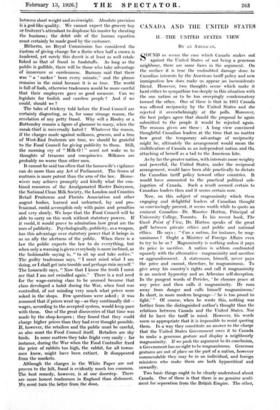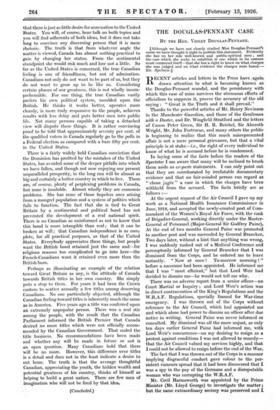CANADA AND THE UNITED STATES
IL—THE UNITED STATES VIEW By AN AMERICAN.
SOUND as seems the case which Canada makes out against the United States of not being a generous neighbour, there are some flaws in the argument. On the surface it is true the undoubted damage done to Canadian interests by the American tariff policy and new immigration law does make us appear an inconsiderate friend. However, two thoughts occur which make it hard either to sympathize too deeply in this situation with the one nation or to be too sweepingly condemnatory toward the other. One of these is that in 1911 Canada was offered reciprocity by the United States and she rejected it overwhelmingly at the polls. Moreover, the best judges agree that should the proposal be again submitted to the people it would be rejected again. The reasons given are these : A long view convinced thoughtful Canadian leaders at the time that no mattes how great the temporary advantage of reciprocity might be, ultimately the arrangement would mean the stultification of Canada as an independent nation and the attaching of herself as a tail to the American kite.
As by far the greater nation, with interests more weighty and powerful, the United States, under the reciprocal arrangement, would have been able practically to dictate the Canadian tariff policy toward other countries. It would have amounted to the practical political sub- jugation of Canada. Such a result seemed certain to Canadian leaders then and it seems certain now.
• Now, on this subject of magnanimity which these engaging and delightful leaders of Canadian thought so convincingly present; it seems worth while to quote an eminent Canadian—Dr. Maurice Hutton, Principal of University College, Toronto. In his recent book, The Greek Point of View, Dr. Hutton speaks of the great gulf between private ethics and public and national ethics. He says : "Can a nation, for instance, be mag- nanimous? Ought a Minister of Foreign Affairs even to try to be so ? Magnanimity is nothing unless it pays its price in sacrifice. A nation is seldom confronted squarely with the alternative—magnanimity and sacrifice or aggrandizement. A statesman, himself, • never pays the price and cannot, therefore, be magnanimous. To give away his country's rights and call it magnanimity is an ancient hypocrisy and an Athenian self-deception. In the pungent words of Pericles, he chooses peace at any price and then calls it magnanimity. He runs away from danger and calls himself magnanimous.' In short, in more modern language—' he is too proud to fight.'" Of course, when he wrote this, nothing was farther from the distinguished author's thought than the relations between Canada and the United States. Nor did he have the tariff in mind. However, his words seem so appropriate that it is impossible to resist quoting them. In a way they constitute an answer to the charge that- the United States Government owes it to Canada to make a generous gesture and display a neighbourly magnanimity. If we push the argument to its conclusion, a Government has no right to be magnanimous. Generous gestures are out of place on the part of a nation, however commendable they may be in an individual, and foreign ministers who make them are both hypocritical and "cowardly.
Two basic .things ought to be clearly understood about Canada. One of these is that there ii no genuine genii- . _ meat for separation from the British Empire. The Other, , that there is just as little desire for annexation to the United States. You will, of course, hear talk on both topics and you will find adherents of both ideas, but it does not take long to convince any discerning person that it is mere rhetoric. The truth is that from whatever angle the matter is viewed, Canada has almost nothing practical to gain by changing her status. From the sentimental standpoint she would risk much and lose not a little. So far as the United States is concerned, the true Canadian feeling is one of friendliness, but not of admiration.
Canadians not only do not want to be part of us, but they do not want to grow up to be like us. Considering certain phases of our greatness, this is not wholly incom- prehensible. For one thing, the true Canadian vastly prefers his own political system, moulded upon the British. He thinks it works better, operates more cleanly, is more truly responsive to the people, achieves results with less delay and puts better men into public life. Not many persons capable of taking a detached view will dispute these things. It is rather convincing proof to be told that approximately seventy per cent. of the qualified voters in Canada regularly go to the polls in a Federal election as compared with a bare fifty per cent. in the United States.
There is a fairly widely held Canadian conviction that the Dominion has profited by the mistakes of the United States, has avoided some of the deeper pitfalls into which we have fallen, and though not now enjoying our present unparalleled prosperity, in the long run will be almost as big and certainly a better country in which to live. There are, of course, plenty of perplexing problems in Canada, but none is insoluble. Almost wholly they are economic problems. She has none of those hopeless ones arising from a mongrel population and a system of politics which fails to function. The fact that she is tied to Great Britain by a sentimental and political bond has not prevented the development of a real national spirit. There is no Canadian so uninformed as not to know that this bond is more intangible than real ; that it can be broken at will ; that Canadian independence is as conx plete, for all practical purposes, as that of the United States. Everybody appreciates these things, but people want the British bond retained just the same and—for religious reasons too complicated to go into here—the French-Canadians want it retained even more than the British born.
Perhaps as illuminating an example of the relation toward Great Britain as any, is the attitude of Canada towards British titles in her own country. She simply puts a stop to them. For years it had been the Crown custom to scatter annually a few titles among deserving Canadians. No one particularly objected, although the Canadian feeling toward titles is inherently much the same as in America. Five years ago a title was conferred upon an extremely unpopular person. There was a real stir among the people, with the result that the Canadian Parliament informed the British Premier that Canada desired no more titles which were not officially recom- mended by the Canadian Government. That ended the title business. No recommendations have been made and whether any will be made in future or not is an open question. Many Canadians hold that there will be no more. However, this difference over titles is a detail and does not in the least indicate a desire to cut loose. The truth is that the average thoughtful Canadian, appreciating the youth, the hidden wealth and potential greatness of his country, thinks of himself as helping to build a great nation. There are few men of imagination who will not be fired by that idea.
(Concluded.)



















































 Previous page
Previous page